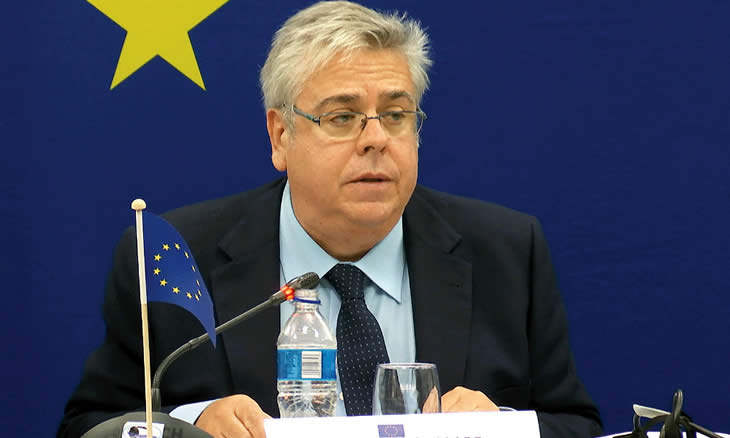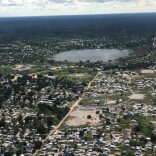Cabo Delgado: Government praises TotalEnergies' efforts in rebuilding Palma
Mozambique elections: Campaign marred by violence and uneven playing field, say EU observers – AIM

Head of the EU Electoral Observation Mission Nacho Sánchez Amor addressing the press in Maputo yesterday. [Photo: O País]
Although the voting in Mozambique’s general elections held on Tuesday was well organised, it was preceded “by a campaign marred by violence, limitations to fundamental freedoms and doubts about the quality of the voter register”, said Ignacio Sanchez Amor, head of the European Union Election Observation Mission, in Maputo on Thursday.
Giving the Observer Mission’s preliminary statement, Sanchez Amor said the election occurred “in a polarised and challenging environment where inter-party violence was prevalent as well as mistrust between the main political parties and a lack of confidence that the electoral administration and the judiciary were independent and free from political influence”.
Just a week before polling day a death squad, consisting of members of the Mozambican police, murdered a prominent Mozambican election observer, Anastacio Matavel, in the southern province of Gaza. This assassination, Sanchez Amor said, worsened “an already existing climate of fear and self-censorship”.
He noted that the country’s established observer groups “experienced difficulties with accreditation, frustrating their efforts to have a wide national coverage and to implement parallel vote tabulation”.
But while almost 3,000 applications from independent observer groups were illegally denied, what Sanchez Amor called “unknown observer groups” secured accreditation. The EU observers at the polling stations “identified a number of organisations unknown to the national observer community of Mozambique”.
During the election campaign, which ran from 31 August to 13 October, there were “regular incidents of a violent nature involving party members or supporters”, he continued. “Limitations on freedoms of assembly and movement of opposition parties were often reported. This included impediments to campaign activities, with blocked road access or occupation of previously announced venues”.
He was referring to the well attested attempts by supporters of the ruling Frelimo Party to deny opposition candidates access to such places as markets.
The EU Mission noted 20 cases of serious impediments to campaign activities, and commented “such cases constitute a flagrant violation of the electoral law on equal access of candidate to public spaces”.
“An unlevel playing field was evident throughout the campaign”, said Sanchez Amor, mentioning Frelimo’s use of state resources, and reports of compulsory financial contributions to Frelimo from teachers and other civil servants.
As for the voter register, Sanchez noted the huge anomaly in Gaza province, where an impossibly large number of voters was registered.
As the press has reported in detail, the Gaza voter registration contradicts the population census of both 2007 and 2017.
The Electoral Administration Technical Secretariat (STAE) set a target for voter registration in Gaza of 1.14 million, and the final number of voters supposedly registered in the province was 1,166,011.
But this is much higher than the number of adults of voting age (18 and above) found in the province during the 2017 census. The census counted the number of people in Gaza at 1,422,460. At a population growth rate in the province of 1.2 per cent, the projected size of the Gaza population in 2019 is 1,456,599.
The National Statistics Institute (INE) says that, of this figure, 836,581 people are aged 18 and above (57.4 per cent of the total), and are thus entitled to register as voters. But the CNE/STAE figure is larger by almost 330,000.
Parliamentary seats are allocated to provinces in proportion to the number of registered voters. Thanks to the extra 330,000, Gaza, traditionally a Frelimo stronghold, gained an extra eight seats – more than any other province gained or lost.
“Insufficient measures were taken to ensure the quality of the voter register”, said Sanchez Amor, adding “the Attorney-General’s Office might have acted more expeditiously to investigate complaints regarding the voter register”.
Mozambique elections: MOE UE Moçambique 2019 Preliminary Statement – Read the full text.https://t.co/HwTbhJU98U pic.twitter.com/aIQTvis8fu
— Club of Mozambique (@clubOmozambique) October 17, 2019
The EU observers visited 807 polling stations, and found that 80 per cent opened on time (at 07.00) or within 30 minutes. The mission assessed the overall conduct of polling operations “as good or very good in almost every observed polling station”.
The mission found that the count was “good or very good” in 58 of the 69 stations where the count was observed. In 47 of them the observers “described the process as transparent and reported that poll workers performed with good intentions”. However, the observers noted four cases of ballot box stuffing in Manica and Sofala provinces.
In 14 stations, the observers found that the results sheets (“editais”) were not posted publicly, although the electoral law clearly states that this is a duty of polling station staff.
The EU Mission will remain in Mozambique until the final proclamation of the results, when it expects to issue a more detailed assessment.













Leave a Reply
Be the First to Comment!
You must be logged in to post a comment.
You must be logged in to post a comment.